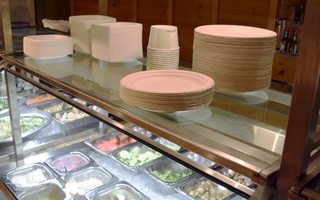{shortcode-9704831d33c049b6a040265c79b40cf531f7815c}
Unsure whether Harvard University Dining Services workers will staff the dining halls Wednesday morning, some students said they would support workers in a potential strike, though others feel they do not know enough about the workers’ negotiations to take a firm stance.
Harvard’s dining workers announced last week that they intend to strike this Wednesday if Harvard and the HUDS' union do not reach a contract agreement by midnight Tuesday, months after the two parties began bargaining in mid-June.
Some students said they are forming their opinions from information disseminated by groups that support HUDS' potential strike. But some said they are uncertain what both sides have offered in the negotiations, what impact a strike could have on their dining, or how long a strike might last.
“I don’t know what to really expect for the strike, but I am on the side of the HUDS workers,” Rachel E. Clemens ’19 said, adding that she felt most other students she knew sided with HUDS.
Marcella J. Park ’19 said she was sympathetic to HUDS because their efforts have involved connecting with students.
"The dining hall workers are people, too," she said.
The Student Labor Action Movement, an undergraduate group that has rallied behind HUDS workers during the most recent round of contract talks with the University, has urged undergraduates to sign up for shifts on a picket line should the workers strike on Wednesday. The organization is hosting what they describe as a “dine-in” Thursday, during which students would bring their trays from the dining halls to eat with HUDS workers in front of Mass. Hall. As of Monday evening, more than 200 people had indicated they would attend the event on Facebook.
Some of their members also spoke to the Undergraduate Council ahead of the body’s vote on whether to support the strike. After a contentious debate, the UC voted 45-3 to endorse the strike, should it occur. Despite an overwhelming majority siding with HUDS, some students raised concerns that no University position was presented to the council, and several representatives said they did not feel well enough informed on the issue.
Though some students felt inclined to support HUDS, others said they did not know enough about the specifics of the negotiations to have an informed position on the strike.
Evan S. Mateen ’20 said that though he understands the gist of the negotiations—which hinge on disagreements over health benefits and wage increases—he was hesitant to immediately support one side over the other.
“I understand why that is a difficult situation for them and why they would be striking to maintain the higher level of health care benefits, but beyond that, I am not really sure what else is occurring at the moment,” Mateen said.
Student support for the strike is not unanimous, however.
“[HUDS] is not striking because they’re underpaid relative to their compatriots in the area, they’re striking because they have a lot of leverage,” Kyle G. Sargent ’19 said.
Sargent said he believed that threatening a strike was opportunistic at a time when Harvard’s endowment returns have performed poorly and the University’s sanctions on single-gender organizations is facing backlash. Sargent said that HUDS workers were already overpaid for their field—they make more hourly than the average dining services worker in the region. He said increasing their salary would be “ridiculous” given that workers do not generally work over breaks; he also does not like the quality of the food.
Students were uncertain how a strike would affect the dining halls, some of which are currently stockpiling frozen food. Some expressed confidence in the College to keep students fed; others said they would wait for further notice from administrators.
“I haven’t really thought about it to be honest,” Clemens said. “But I think [the negotiations] are more important than me being inconvenienced, if that’s what you could call it.”
—Staff writer Brandon J. Dixon contributed to the reporting of this article.
—Staff writer Graham W. Bishai can be reached at graham.bishai@thecrimson.com.
Read more in College News
European Secondary Frustrates Advocates for Ethnic Studies
















